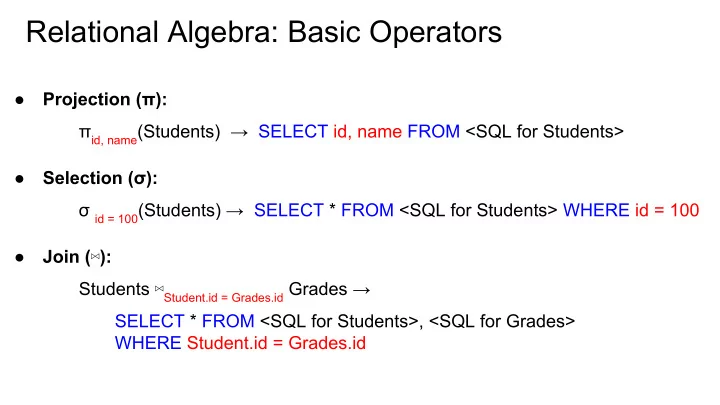

Relational Algebra: Basic Operators ● Projection (π): π id, name (Students) → SELECT id, name FROM <SQL for Students> ● Selection (σ): σ id = 100 (Students) → SELECT * FROM <SQL for Students> WHERE id = 100 ● Join ( ⋈ ): Students ⋈ Student.id = Grades.id Grades → SELECT * FROM <SQL for Students>, <SQL for Grades> WHERE Student.id = Grades.id
Relational Algebra: More operators ● Set operations ( ⋃ , ⋂ , −): Same as in SQL (UNION, INTERSECT, MINUS) Renaming ( ⍴ ): ● ⍴ S(i,n) (Students) → (SELECT id AS i, name AS n FROM Students) AS S ● Removing duplicates (δ): δ(R) → SELECT DISTINCT * FROM <SQL for R> ● Grouping/aggregation ( 𝛅 ): 𝛅 id, AVG(grade) → average (Grades) → SELECT id, AVG(grade) AS average FROM <SQL for Grades> GROUP BY id
Relational Algebra: Sanity check ● Every condition, projection, etc. should ONLY mention attributes that exists in their operands. Students(idnr, name) “Select the students with at least Grades(student, course, grade) two passed courses with a grade student -> Students.idnr of at least 3” π name ( σ passed>=2 AND idnr=student AND grade>=3 (Students ⋈ γ student, COUNT(*) → passed (Grades)))
Relational Algebra: Sanity check ● Every condition, projection, etc. should ONLY mention attributes that exists in their operands. Students(idnr, name) “Select the students with at least Grades(student, course, grade) two passed courses with a grade student -> Students.idnr of at least 3” π name ( σ passed>=2 AND idnr=student AND grade>=3 (Students ⋈ γ student, COUNT(*) → passed (Grades))) Can not use grade here!
Relational Algebra: Sanity check ● Every condition, projection, etc. should ONLY mention attributes that exists in their operands. Students(idnr, name) “Select the students with at least Grades(student, course, grade) two passed courses with a grade student -> Students.idnr of at least 3” π name ( σ passed>=2 AND idnr=student (Students ⋈ γ student, COUNT(*) → passed We need to filter by grade before the ( σ grade>=3 (Grades)))) aggregating our data!
Recommend
More recommend